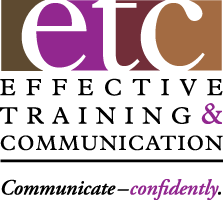Enjoy this little treat for your Tool Kit to enjoy after your Thanksgiving feast with my compliments. I’m so pleased that you continue to value this short and simple feature. And this month’s questions are …
#1. What shouldn’t we say when answering audience questions?
What we don’t say when responding to audience questions is almost as important as what we do say. So, avoid these five phrases as much as possible:
- “Thanks for your question.” This contrived attempt at courtesy doesn’t accomplish anything except taking time away from your answers. If you say it with every question, it gets lame and repetitious. If you don’t, someone’s feelings could be hurt.
- “That’s a great question.” How could you tell so quickly? And if it was such a great question, you should have answered it in your presentation. And again, if you say it with every question …
- “The question is …” Simply repeat it if it’s short or simple or begin the answer with the content of the question. For example, if the question is ‘What’s the ROI of this project?’ begin your answer with ‘The ROI of this project is … ‘. With longer or more complex questions, rephrase them. Also see above about repetitious and lame.
- ‘If I understand you correctly… ‘Why suggest you might not understand? If you don’t, you shouldn’t be up there.
- ‘Did I answer your question?’ Why suggest you might not have answered it? If you didn’t, it’s the questioner’s job to tell you and clarify the question.
So, avoid all the unnecessary verbiage and just answer the questions clearly and concisely. Your audiences will appreciate your efforts at brevity on their behalf. Any Questions?
2. Can I open or close a presentation with quotes from other people? I heard that you want the audience’s first and last impressions to be of your own words, not those of someone else.
I suggest that workplace presenters start strong and grab the audience’s attention immediately. Using a pertinent quote, statistic, fact or question all can work. I haven’t heard that suggestion to start and end with you own words instead before. I’m more interested in how effective, compelling and engaging those words are rather than whose words they are.
In crafting strong endings for my own presentations, my last words often involve restating the content’s value proposition or the call to action for the audience – usually my words. But, I might reconnect to the original attention-getting quote or statistic if it works better.
So, go with what works best for you … your audience and your objectives.
3. I need to use reading glasses to see my notes and that makes it difficult to focus in on audience members’ eyes. Now what?
Simply create actual speaker notes instead of a copy of your outline, or worse, a verbatim text. Notes should be short and simple with a few key words. Increase the font size to 18 point and make the text bold. You ought to be able to easily see them without your cheaters. Try to make the type large enough so you can even leave them on the table in front of you and still easily see them.
Hope you enjoyed this little Thanksgiving treat. Next month – another helping of your questions and my answers.
